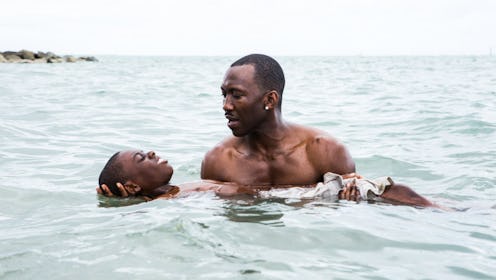
When Barry Jenkins' indie film Moonlight pulled off a surprising Best Picture win at this year's Oscars, it was considered a victory for the LGBTQ community. But, according to GLAAD, the film, which focuses on a young black gay man's coming of age in Miami, was one of the few brights spots in a year where well-written gay, lesbian, bisexual, transgender, and queer characters were hard to come by. In GLAAD's fifth annual Studio Responsibility Index — which looks at the quantity, quality, and diversity of LGBTQ people in films released by the seven major studios — the organization found that, once again, the LGBTQ community was underrepresented in movies.
Making matters worse, the study also found that when studios did manage to include an LGBTQ character on-screen, they were too often the butt of jokes. The takeaway? Studios need to understand that their films don't just need to include more characters that represent the LGBTQ community, they need better characters.
Five years ago, GLAAD created the "Vito Russo Test," which analyzes how well LGBTQ characters are represented in works of fiction. Specifically, the test, which was partly inspired by the Bechdel Test, checks whether a clearly identifiable gay, lesbian, bisexual, transgender, and/or queer character is not defined by their sexual orientation or gender identity, and that they play a significant role in the plot. "Meaning they are not there to simply provide colorful commentary, paint urban authenticity, or (perhaps most commonly) set up a punchline," GLAAD explained in this year's Studio Responsibility Index.
Out of the 125 films released by the major studios in 2016, 23 films were deemed LGBTQ-inclusive films; however, the study found that only nine of those 23 passed the Vito Russo Test. Disappointingly, this is only a slight step up from last year's index when only eight out of 22 inclusive films released in 2015 passed the test.
GLAAD describes the Vito Russo Test as a "minimum standard" of LGBTQ inclusion that they expect mainstream Hollywood to hit, but it's a low bar that most still cannot pass. Even when films have LGBTQ characters — this year, there was an overall rise, but there's still a lot of room for improvement — their portrayal is too often problematic or offensive. The LGBTQ community is not entirely invisible in film, but the kinds of characters that are being created still need a lot of work. In fact, this year's study found that nearly half of the inclusive films released by the seven major studios included "less than one minute of screen time" for their LGBTQ characters.
Comedy is most often the most LGBTQ-inclusive genre, which was true once again in 2016, where, out of the 125 major studio films GLAAD tracked, 39 were defined as comedies. Out of those 39, only 12 were LGBTQ-inclusive — but movies like Dirty Grandpa and Zoolander 2, which included LGBTQ characters, used them as the punchline to offensive jokes that "relied on gay panic and defamatory stereotypes for cheap laughs," according to GLAAD. Bustle reached out to representatives of both studios for comment, but did not receive an immediate response.
"Comedy can be a powerful tool in challenging existing norms," the study explained, "but, when crafted without thought, these jokes have the opposite effect by signaling that anti-LGBTQ attitudes are acceptable." Studios may be making strides in how many characters they're including in films — though a vast majority were minor or supporting — but they need to put more thought into the kinds of characters they're creating.
In a statement, GLAAD President and CEO Sarah Kate Ellis explained,
"Films like Moonlight prove there is a huge opportunity to not only tell LGBTQ stories worthy of Oscar gold, but to open the hearts and minds of audiences here and around the world in places where these stories can be a lifeline to the people who need it most."
This is why it's not enough for Hollywood to simply cast LGBTQ characters; it never was. What studios need to do to be truly inclusive is create LGBTQ-identifying characters that are actually human — not punchlines.